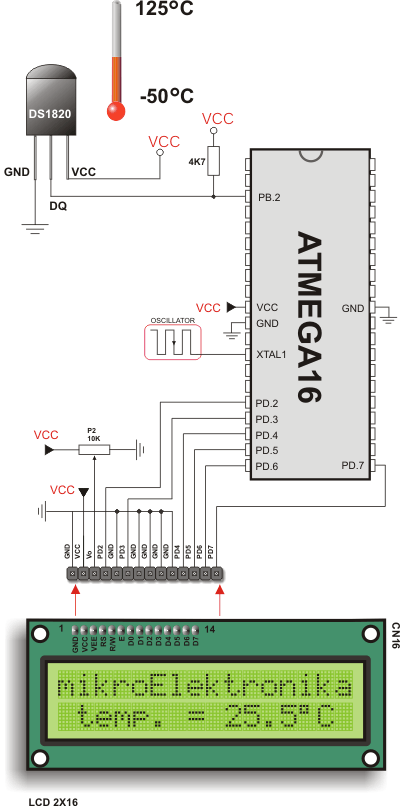OneWire Library
The OneWire library provides routines for communication via the Dallas OneWire protocol, e.g. with DS18x20 digital thermometer. OneWire is a Master/Slave protocol, and all communication cabling required is a single wire. OneWire enabled devices should have open collector drivers (with single pull-up resistor) on the shared data line.
Slave devices on the OneWire bus can even get their power supply from data line. For detailed schematic see device datasheet.
Some basic characteristics of this protocol are:
- single master system,
- low cost,
- low transfer rates (up to 16 kbps),
- fairly long distances (up to 300 meters),
- small data transfer packages.
Each OneWire device also has a unique 64-bit registration number (8-bit device type, 48-bit serial number and 8-bit CRC), so multiple slaves can co-exist on the same bus.
 Important :
Important :
- Oscillator frequency Fosc needs to be at least 8MHz in order to use the routines with Dallas digital thermometers.
- This library implements time-based activities, so interrupts need to be disabled when using OneWire library.
Library Routines
Ow_Reset
| Prototype |
unsigned short Ow_Reset(unsigned short *port, unsigned short pin); |
|---|---|
| Returns |
|
| Description |
Issues OneWire reset signal for DS18x20. Parameters :
|
| Requires |
Devices compliant with the Dallas OneWire protocol. |
| Example |
To reset the DS1820 that is connected to the RB2 pin: // Issue Reset signal on One-Wire Bus Ow_Reset(&PORTB, 2); |
Ow_Read
| Prototype |
unsigned short Ow_Read(unsigned short *port, unsigned short pin); |
|---|---|
| Returns |
Data read from an external device over the OneWire bus. |
| Description |
Reads one byte of data via the OneWire bus. Parameters :
|
| Requires |
Devices compliant with the Dallas OneWire protocol. |
| Example |
// Read a byte from the One-Wire Bus unsigned short tmp; ... tmp = Ow_Read(&PORTB, 2); |
Ow_Write
| Prototype |
void Ow_Write(unsigned short *port, unsigned short pin, unsigned short par); |
|---|---|
| Returns |
Nothing. |
| Description |
Writes one byte of data via the OneWire bus. Parameters :
|
| Requires |
Devices compliant with the Dallas OneWire protocol. |
| Example |
// Send a byte to the One-Wire Bus Ow_Write(&PORTB, 2, 0xCC); |
Library Example
This example reads the temperature using DS18x20 connected to pin PORTB.2. After reset, MCU obtains temperature from the sensor and prints it on the Lcd. Make sure to pull-up PORTB.2 line and to turn off the PORTB leds.
// LCD module connections
sbit LCD_RS at PORTD2_bit;
sbit LCD_EN at PORTD3_bit;
sbit LCD_D4 at PORTD4_bit;
sbit LCD_D5 at PORTD5_bit;
sbit LCD_D6 at PORTD6_bit;
sbit LCD_D7 at PORTD7_bit;
sbit LCD_RS_Direction at DDD2_bit;
sbit LCD_EN_Direction at DDD3_bit;
sbit LCD_D4_Direction at DDD4_bit;
sbit LCD_D5_Direction at DDD5_bit;
sbit LCD_D6_Direction at DDD6_bit;
sbit LCD_D7_Direction at DDD7_bit;
// End LCD module connections
// Set TEMP_RESOLUTION to the corresponding resolution of used DS18x20 sensor:
// 18S20: 9 (default setting; can be 9,10,11,or 12)
// 18B20: 12
const unsigned short TEMP_RESOLUTION = 9;
char *text = "000.0000";
unsigned temp;
void Display_Temperature(unsigned int temp2write) {
const unsigned short RES_SHIFT = TEMP_RESOLUTION - 8;
char temp_whole;
unsigned int temp_fraction;
// check if temperature is negative
if (temp2write & 0x8000) {
text[0] = '-';
temp2write = ~temp2write + 1;
}
// extract temp_whole
temp_whole = temp2write >> RES_SHIFT ;
// convert temp_whole to characters
if (temp_whole/100)
text[0] = temp_whole/100 + 48;
else
text[0] = '0';
text[1] = (temp_whole/10)%10 + 48; // Extract tens digit
text[2] = temp_whole%10 + 48; // Extract ones digit
// extract temp_fraction and convert it to unsigned int
temp_fraction = temp2write << (4-RES_SHIFT);
temp_fraction &= 0x000F;
temp_fraction *= 625;
// convert temp_fraction to characters
text[4] = temp_fraction/1000 + 48; // Extract thousands digit
text[5] = (temp_fraction/100)%10 + 48; // Extract hundreds digit
text[6] = (temp_fraction/10)%10 + 48; // Extract tens digit
text[7] = temp_fraction%10 + 48; // Extract ones digit
// print temperature on LCD
Lcd_Out(2, 5, text);
}
void main() {
Lcd_Init(); // Initialize LCD
Lcd_Cmd(_LCD_CLEAR); // Clear LCD
Lcd_Cmd(_LCD_CURSOR_OFF); // Turn cursor off
Lcd_Out(1, 1, " Temperature: ");
// Print degree character, 'C' for Centigrades
Lcd_Chr(2,13,223); // Different LCD displays have different char code for degree
// If you see greek alpha letter try typing 178 instead of 223
Lcd_Chr(2,14,'C');
//--- main loop
do {
//--- perform temperature reading
Ow_Reset(&PORTB, 2); // Onewire reset signal
Ow_Write(&PORTB, 2, 0xCC); // Issue command SKIP_ROM
Ow_Write(&PORTB, 2, 0x44); // Issue command CONVERT_T
Delay_us(120);
Ow_Reset(&PORTB, 2);
Ow_Write(&PORTB, 2, 0xCC); // Issue command SKIP_ROM
Ow_Write(&PORTB, 2, 0xBE); // Issue command READ_SCRATCHPAD
Delay_ms(400);
temp = Ow_Read(&PORTB, 2);
temp = (Ow_Read(&PORTB, 2) << 8) + temp;
//--- Format and display result on Lcd
Display_Temperature(temp);
Delay_ms(500);
} while (1);
}
HW Connection

Example of DS1820 connection
What do you think about this topic ? Send us feedback!




